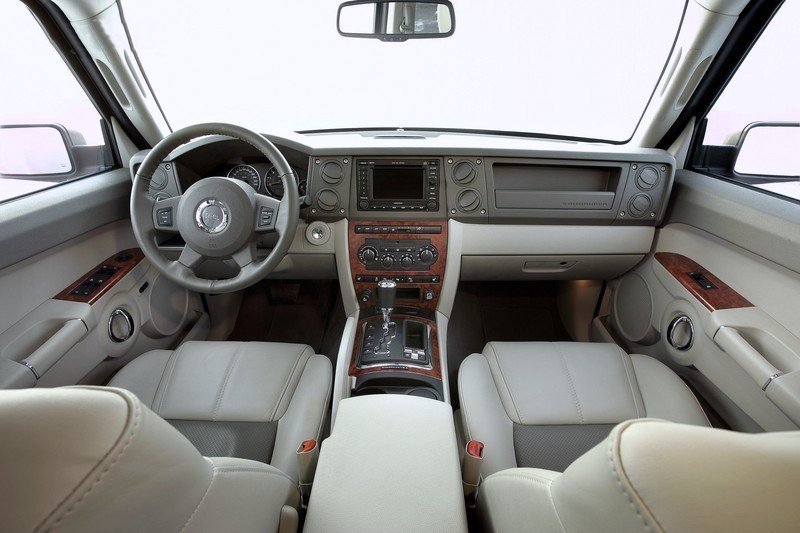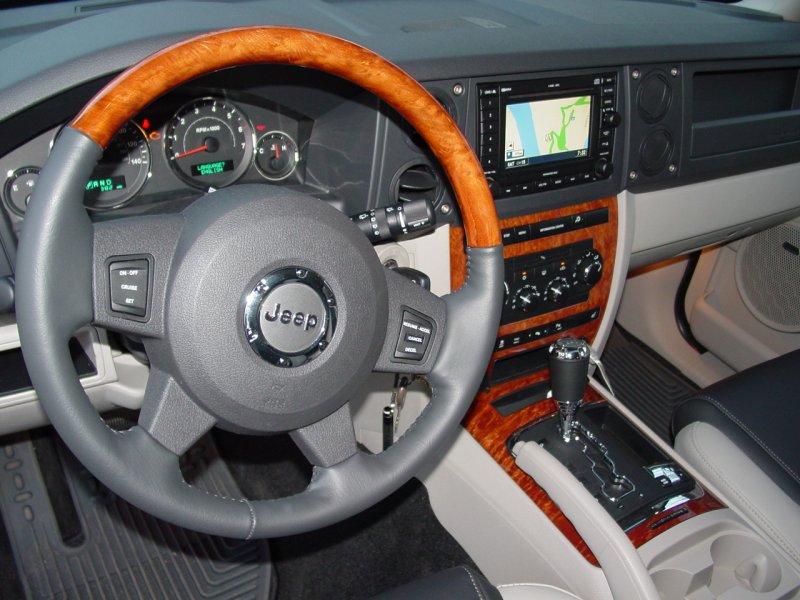This trip would introduce us to the
factory-provided navigation system in the Commander. Local use of the
system had shown that while it will provide considerable navigation support, it
has many artificially imposed limitations that make it somewhat frustrating to
use. Most notably, it appears to have been "lawyered up" by its refusal to
accept input if the vehicle is not in "Park". This means that nobody,
not even a passenger, can feed it requests for a new destination if the vehicle
is moving. We will see in a minute why the manufacturer felt this was
necessary...
Secondly, and again apparently stimulated by some fear of
litigation, it will not provide turn-by-turn directions in areas where the
streets have not been "verified". So even though it will pinpoint an
address on a street, if that street has not been "verified", it will
announce repeatedly that turn by turn routing cannot be provided because you are
in an area of unverified streets. In other words, you're on your own.
It won't tell you time to destination and when you get to the end of
turn-by-turn navigation, it shows the street map with a straight line (as the
crow flies) from where you are, to your destination). My 1999 Garmin
GPS
12s provide as much functionality under these conditions as the OEM unit.
To further diminish the value of the unit, it
attempts to provide input assistance. Well, except that it disregards that
it "knows" what city and state you are in - in all the operations where searches
are performed, it requires you to tell it what city you want to search.
It does not default to the current location and therefore adds another text
entry task, which as I have already commented, cannot be performed if you are
moving.

The input interface is via a joy stick/knob, of
all things, so you must rotate or toggle the knob to enter each letter. As
you enter the name of a location or street, only the theoretically next
available letters are displayed. No doubt it was designed this way to
reduce the number characters you need to skip to enter data. But it's
counterintuitive. Also, if you reach a point in the data entry where there
is only one thing in the database that matches the beginning part of what you're
spelling, it is defaulted. Now that sounds really handy but ironically,
you must still toggle down to the search option and search for that item in the
list even though it is the only one in the list. So it is rather moot.
The display during travel to a selected route
is dumbed down. Well actually it's a little like idiot lights in a sports
car. For example, the route you are provided is displayed as a blue line
on the large display map but there is no option to view a screen with
turn-by-turn text info. The turn cues are displayed on a very primitive
map drawing and your current location in relation to the turn is not displayed.
So for complex intersections where there might be several roughly similar
choices, you won't know until after you execute a turn whether or not you are on
the right street. If you get it right, things are pretty quiet. If
not, the unit starts recalculating and pretty soon you get some new turns to
execute to get you back on track. I could see this sequence of events
pretty much putting you down a rabbit hole of course corrections to course
corrections. Don't miss the turn...
If you forget to enter your target
city/state/province/country (which is buried in another menu), then any search
you do brings up a list of possible matches from here to Katmandu. The
whole thing was very frustrating in actual use. There's too many feeble
attempts to make the unit anticipate your next key stroke while at the same time
ignoring several intelligent things that would reduce key strokes.

What it
does well is route you to destinations that are in the points of interest
database - if you manage to put in every prerequisite piece of information
first AND enter the name of the place perfectly. To me, it
operates on the level of detail of the road map you used to get free from gas
stations, and using it is like trying to play pick-up-sticks while wearing
mittens.
I own two Garmin GPS V and two GPS 12 units
that have been discontinued by Garmin. I have been using these units since
2001. The newer Garmin units outperform the GPS V and GPS 12 in so many
ways it makes sense that Garmin discontinued them, though indeed they are very
refined and useful GPSrs. The Garmin user interface is so logical it
defies comparison, and makes any navigation task quick and easy, passively
preventing errors. It's portable and does not bring its own lawyer along.
It will route you over a cliff if the map says there's a road there and it's on
the shortest or fastest path to your destination. I like that. It
means I still get to use my head once in a while.
So with our local experience of the Jeep
factory GPSr in mind, I spent an evening chunking out seven trip segments and
saving them to my laptop so that I could bring the two Garmin GPS V units along
and use them as a "backup" to the Jeep navigation system. As we would find
on the trip, the only problems we experienced with the OEM Jeep system were user
interface problems. It worked very well once you managed to tell it what
you wanted and got the lawyer out of the way (we tied her up and put her in the
third row seats with a gag).
In all the navigation we did, the Jeep system
duplicated the auto-routes recommended by the Garmin, and put us on the location
precisely. As long as we're willing to accept the lousy user interface,
bogus limitations, and inability to upload or download information, the Jeep
navigation system could be relied upon to successfully support a trip like ours.
We're just used to full-strength GPSr so found this system a bit too much like
the rest of Pop Culture - watered down, needlessly "simple", and designed to
protect us from ourselves...
This is disappointing because it probably
leaves people new to GPS technology unaware of what is really possible.
And though I don't generally discuss price, let me say in relative terms that
the GPSr unit supplied by the factory costs roughly six times what a comparable
unit from Garmin would cost, and still has limitations that the Garmin does not.
If you are weighing the choice of a factory installed GPS versus one you can buy
separately, and you do the kinds of things I do (hiking, camping, geocaching,
exploring) get the separate - it is considerably more flexible, can be used away
from the vehicle, and overall will provide a better level of service. If
on the other hand you have money to burn, like gas station road maps, and like
having a lawyer along on your trip, go for the factory unit.
Visitors since
3/27/07